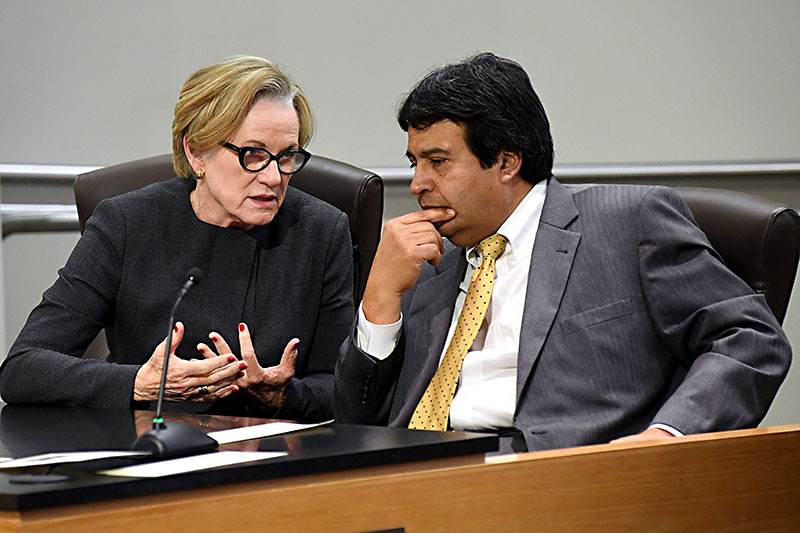C.A. + D.A. = C.D.A.?
County may send attorney merger to Lege
By Michael King, Fri., Nov. 9, 2018
Travis County Commissioners Court is tentatively scheduled to decide this Tuesday, Nov. 13, whether to add the proposed district attorney/county attorney merger to its 2019 legislative agenda. It might not happen quite that quickly, but based on conversations with various stakeholders and the commissioners themselves, it looks increasingly likely that the court will vote to approve the concept. County Judge Sarah Eckhardt and commissioners Gerald Daugherty and Brigid Shea appear nearly ready to vote yes, and the two remaining – Jeff Travillion and Margaret Gómez – continue to raise questions, but at least suggest they're ready to be persuaded.
The idea to merge the two offices into a consolidated Criminal District Attorney's Office has been around for decades, in part because it's common elsewhere in Texas – used in 49 counties, including Bexar, Dallas, Hidalgo, and Tarrant, as well as Bastrop, Caldwell, and Hays here in Central Texas. When District Attorney Margaret Moore (herself a former Travis County attorney) took office in 2017, she was approached by incumbent C.A. David Escamilla about considering the change once again, and the two have since been discussing the merger proposal with prosecutorial staff, various attorney and advocacy groups, and in recent weeks the Commissioners Court.
The prosecutors and other proponents argue that the merger would not only improve administrative efficiency and reduce costs, but also take a major step toward more fairness in the criminal justice system. As Moore and Escamilla see it – and as their staffs have presented to the court – a merger would mean less duplication in prosecutorial administration (combining the now-split prosecutions of felonies and misdemeanors) and shorter delays for the accused. It would also let prosecutors finally assume (from arresting officers and magistrates) the 24/7 intake and charging procedures at the Travis County Jail, meaning more accurate and perhaps fewer charges. As Escamilla told the Chronicle earlier this year, "Each year, there are something like 4,000 defendants with felony and misdemeanor cases; under a merged structure, just one office would make priority decisions, and there would be fewer cases filed, fewer touches to the criminal justice system, and less money involved."
The prosecutors say the merger will provide both financial and justice benefits: fewer cases filed per defendant; fewer pretrial incarceration days; less duplication of digital evidence storage (an increasing burden); quicker and more efficient resolution of cases. Some skeptics have reluctantly granted that it might be more efficient, but they remain content under the current structure and repeat, "If it ain't broke, don't fix it." Moore has begun to bristle at that refrain, responding, "It is broken for the people who are sitting in jail for multiple charges" that might not be necessary under a streamlined prosecution. She insists that a merged system would not only be more efficient, but also more just.
With several presentations having already been made to the court, last week I asked the commissioners for their current perspectives. Eckhardt (a former prosecutor in the C.A.'s Office) said bluntly, "I am thoroughly convinced the merger is good for justice, and good for the county budget," although she acknowledged that some of the "nuts and bolts" remain to be fine-tuned. "But we've got time to work through those," she said, noting that any newly elected criminal district attorney wouldn't take office before 2020.
Daugherty said, "I guess if I had to vote tomorrow, I would vote for it," although he does have some remaining questions. He emphasized that he's not an attorney, and wants to hear more from defense attorneys with specific concerns. "I'm always in favor of efficiencies," he said, but as a non-attorney, "I don't know what I don't know. I'm trying to be as mindful as I can be," he concluded, "and give it my dead-level best to answer all the questions" before voting.
Travillion and Gómez are more hesitant, though both indicated they can be persuaded. "I'm keeping an open mind," said Travillion. "I'm not seeing all the things I need to see to support it." Travillion described himself as a "project management person" determined to "understand the particulars. The devil is in the details." He's not yet convinced, for example, that the 24/7 prosecutorial intake couldn't be accomplished administratively, without the Legislature.
Gómez said she wants to be certain that the county's civil representation – which would be a separate attorney section under the consolidation – would remain strong. "It's not just an efficiency question," she said. "There's a real public policy interest involved."
That leaves Shea, who said, "In general, I'm supportive of the idea. There's a lot of efficiencies that could be achieved," adding, "I was stunned to learn the amount of current duplication" under the current system, everything from digital police records to the doubling-up of charges against the accused. She said the potential benefits of more accurate charging and fewer days in jail seem substantial. "My understanding is this merger will go a long way to solving those problems," she said.
Shea did raise the concern of Travis County making requests of an often hostile Legislature, even though proponents say any bill in danger of being hijacked – e.g., to allow the governor to appoint the new criminal D.A., rather than hold an election – could be withdrawn. "I want to make sure we have a kill switch," Shea said.
A couple of commissioners said that while they're leaning toward approval, they might not be ready to vote on the legislative agenda this week. Responded Eckhardt, "People say I can be kind of pushy, and I suppose that's true. But if my colleagues want more time, that's fine."
Got something to say on the subject? Send a letter to the editor.










